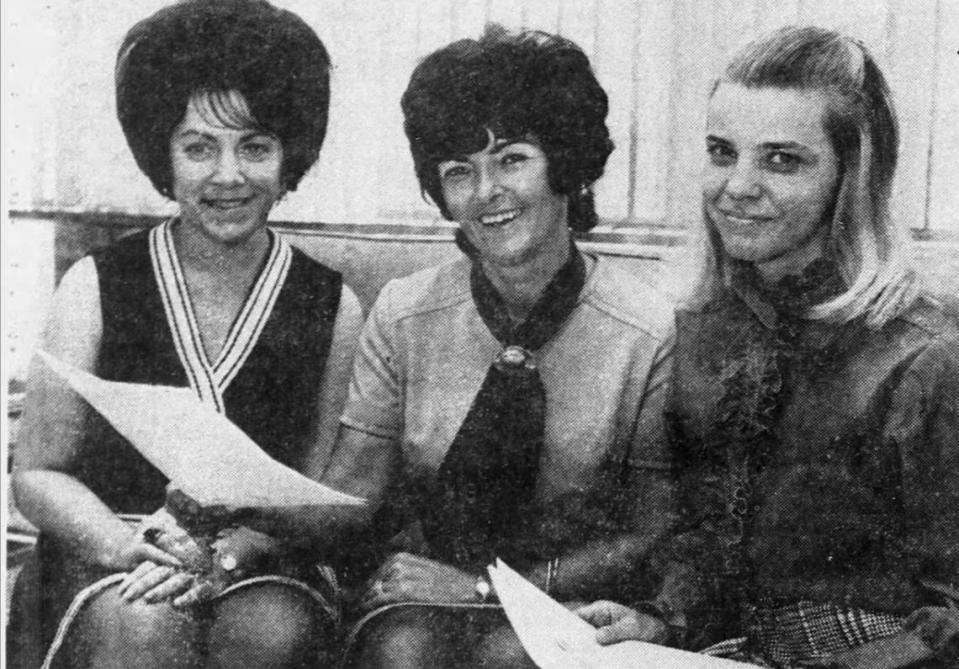Judge orders Florida retiree, 81, extradited to Canada to face 50-year-old murder charge
An 81-year-old South Florida man has been ordered by a judge to be sent to Canada where he’s charged with the fatal strangling of an American woman nearly 50 years ago in one of the country’s oldest and most infamous cold cases.
Rodney Mervyn Nichols, who was arrested in July at his assisted-living facility in Hollywood but was released on bond, must surrender to the U.S. Marshals Service for his extradition to Ontario at a future date, according to an order issued Monday by U.S. Magistrate Judge Jared Strauss in Fort Lauderdale federal court.
In 1975, Canadian police discovered a partially nude woman floating face down in a river west of Montreal — her hands and ankles strapped with neckties, her neck bound with a black coaxial cable wire, and her head covered with a hand cloth, towel and tablecloth. The identity of the woman, Lalla Jewel Langford, 48, would not be known to authorities until 2021, based on a DNA sample of her exhumed body that matched up with her relatives.
Nichols was charged with Langford’s murder, based again on DNA technology along with a confession.
“There is probable cause to believe that the fugitive before this court, the same person identified in the extradition request from the Government of Canada, committed the offense for which extradition is sought,” Kraus wrote in his order issued Monday.
Now the U.S. Department of State must certify the surrender order before Nichols can be legally extradited to Canada.
In early February of last year, officers with the Ontario Provincial Police traveled to Hollywood to question Nichols with FBI agents at the North-Lake Retirement Home. Nichols, who lived with Langford after she had moved from Tennessee to Montreal 48 years ago, admitted to the crime when investigators showed him photographs of the neckties that had been used to bind her hands and ankles.
Nichols “identified the neckties as belonging to him,” according to an extradition complaint filed by U.S. prosecutor Lawrence LaVecchio in Fort Lauderdale federal court, the day before Nichols’ arrest on July 25.
“Canadian authorities then advised Nichols that he had admitted to the murder of Langford and that he could be charged,” the complaint says. After consulting with a legal aid lawyer in Canada, Nichols told investigators that “he had an altercation with Langford that started in his home in Montreal, and that he subsequently dumped her body in the Nation River.”
When asked why he confessed, Nichols said he “had to come clean,” the complaint says.
In a court filing, Nichols’ lawyer with the Federal Public Defender’s Office questioned the validity of the confession, asserting that the former Canadian man suffers from dementia, needs medication and must use a wheelchair. Assistant Federal Public Defender Bernardo Lopez said that despite the serious charge, Nichols should be allowed to return to his assisted-living facility in Hollywood where he had lived in recent years until the extradition request from Ontario.
Krauss, citing these conditions, allowed Nichols to stay at the Hollywood facility with an electronic monitor while he awaits extradition by the U.S. Marshals Service to Canada.
‘Nation River Lady’
Langford had been known for decades only as the “Nation River Lady” after her remains were found on May 3, 1975, floating in the Nation River, a short distance from a highway bridge near Casselman, Ontario — about 90 miles west of Montreal.
Technology that uses DNA to find genetic matches led to identifying her as Langford, Ontario Provincial Police said.
Police said Langford’s case marked the first time that Canadian authorities used genetic forensic technology to identify a victim. Other methods of identification, including creating a 3D facial approximation of her in 2017, were tried but had no success.
Detective Inspector Daniel Nadeau said Langford was a well-known member of the business community in Jackson, Tennessee, who co-owned a spa with her ex-husband.
She traveled to Montreal in April 1975 and moved into a house with her boyfriend, Nichols, then 32.

“At that time, her family in Tennessee had reported her missing,” Nadeau said.
At the time of her disappearance, Langford’s belongings, including her Cadillac, remained at her home in Montreal, according to the extradition complaint. The Montreal Police Service investigated her disappearance, but were unable to locate Langford or bring charges.
A May 1975 autopsy report by Canadian authorities “revealed two fracture injuries to the victim’s larynx,” and then a coroner’s report concluded that the “cause of death was strangulation by ligature of the neck.”
“Further, the absence of water in the victim’s lungs suggested to Canadian authorities that she was deceased before entering the water,” the extradition complaint says.
In June 1975, Montreal police investigators questioned Nichols at the home he shared with Langford, but they did not consider him a suspect, according to the complaint. Nichols said the couple got into an argument and that she left on her own for Vancouver that June, calling him by phone to join her there.
Langford’s identity remained unknown for more than 40 years because of the unavailability of DNA evidence. In 2011, Canadian authorities conducted a forensic analysis of the items found on the victim’s body, including two large, blood-stained pieces of green cloth that covered her face and neck when her body was found in the Nation River.

